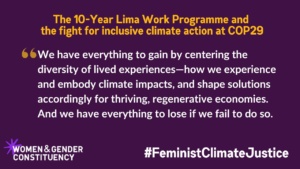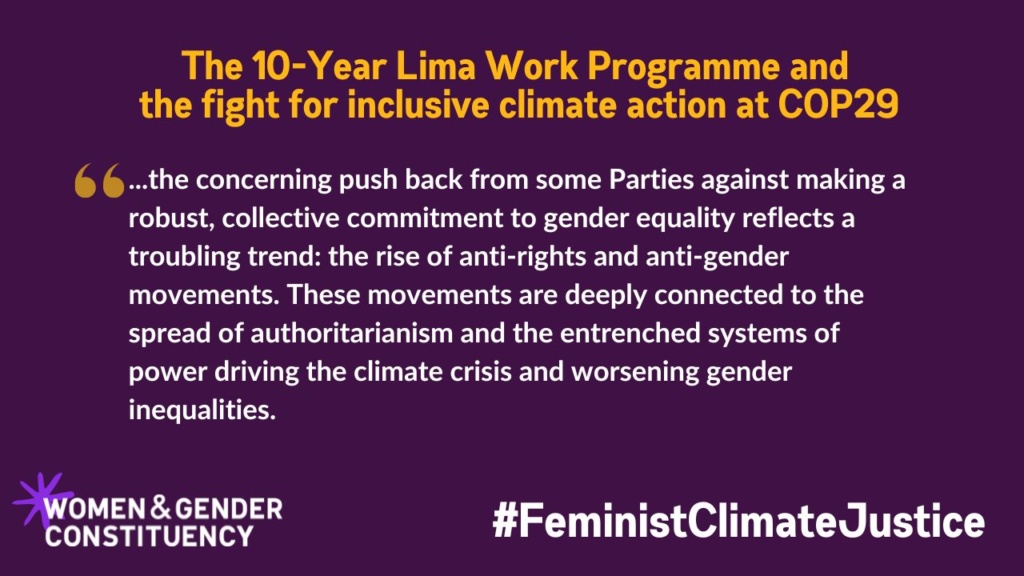 At COP29 in Baku, Parties adopted the 10-year renewal of the Enhanced Lima Work Programme on Gender, in a decision that reaffirms the important role of the work programme in advancing gender equality and women’s empowerment in the UN Climate Change process.
At COP29 in Baku, Parties adopted the 10-year renewal of the Enhanced Lima Work Programme on Gender, in a decision that reaffirms the important role of the work programme in advancing gender equality and women’s empowerment in the UN Climate Change process.
Feminists fought hard amid pushback on equality and rights. It’s a win, but without public finance, gender-just climate action remains a dream.
Read the statement of the Women and Gender Constituency below or download the statement as a PDF.
We are here at COP29, where Parties have adopted an enhanced Lima work programme on gender.
This marks an important step forward, establishing a 10-year work programme, encouraging mainstreaming gender- and age-disaggregated data, and providing a clear roadmap to develop a gender action plan (GAP) next year towards COP30.
The negotiations, however, were marked by hours of pushback on language addressing human rights and equality. Parties reiterated their previously stated red lines, including opposition to the efforts to broaden our understanding and cater to the lived realities and experiences of women and girls in all their diversity and gender diverse people.
 The climate crisis impacts people in different ways depending on intersecting identities and the multiple forms of discrimination they face. Furthermore, women and girls and gender diverse people can provide rich experience and knowledge on how to generate equitable and ambitious climate action. Advocating for intersectionality means confronting the realities of power: who holds it, who defines it, who needs it, and how we build and define a just transition. Acknowledging and addressing these needs and experiences should have been a crucial element of the work programme. Instead, we’ve witnessed the opposite, and we are deeply disappointed.
The climate crisis impacts people in different ways depending on intersecting identities and the multiple forms of discrimination they face. Furthermore, women and girls and gender diverse people can provide rich experience and knowledge on how to generate equitable and ambitious climate action. Advocating for intersectionality means confronting the realities of power: who holds it, who defines it, who needs it, and how we build and define a just transition. Acknowledging and addressing these needs and experiences should have been a crucial element of the work programme. Instead, we’ve witnessed the opposite, and we are deeply disappointed.
We recognize the commitment of some Parties, those who held firm in ensuring that there was at least no regression on previously agreed language and pushed for a more inclusive work programme. Likewise, we commend the tireless advocacy of women, girls, gender-diverse people, and feminist advocates both from within and outside of the Women and Gender Constituency (WGC), whose efforts ensured these issues remained a priority for Parties and the COP29 Presidency.
The 10-year work programme offers hope to further push gender-responsive climate action, even as we acknowledge that significant challenges remain. The extended timeline of the work programme will provide an opportunity for increased action at the party level and for the meaningful integration of gender in climate decision-making in the upcoming gender action plan. Nevertheless, the concerning push back from some Parties against making a robust, collective commitment to gender equality reflects a troubling trend: the rise of anti-rights and anti-gender movements. These movements are deeply connected to the spread of authoritarianism and the entrenched systems of power driving the climate crisis and worsening gender inequalities.
As we reflect on this moment, we recognize the progress made and the critical work that lies ahead to ensure that gender equality remains central to global climate action, for the sake of fairness and effectiveness.
With a clear roadmap established in the enhanced Lima work programme on gender towards developing a GAP, we need to ensure that it delivers on its potential and is truly ambitious. To us, ambition means an intersectional, inclusive, measurable, cohesive, and funded gender action plan.
We have everything to gain by centering the diversity of lived experiences—how we experience and embody climate impacts, and shape solutions accordingly for thriving, regenerative economies. And we have everything to lose if we fail to do so.


